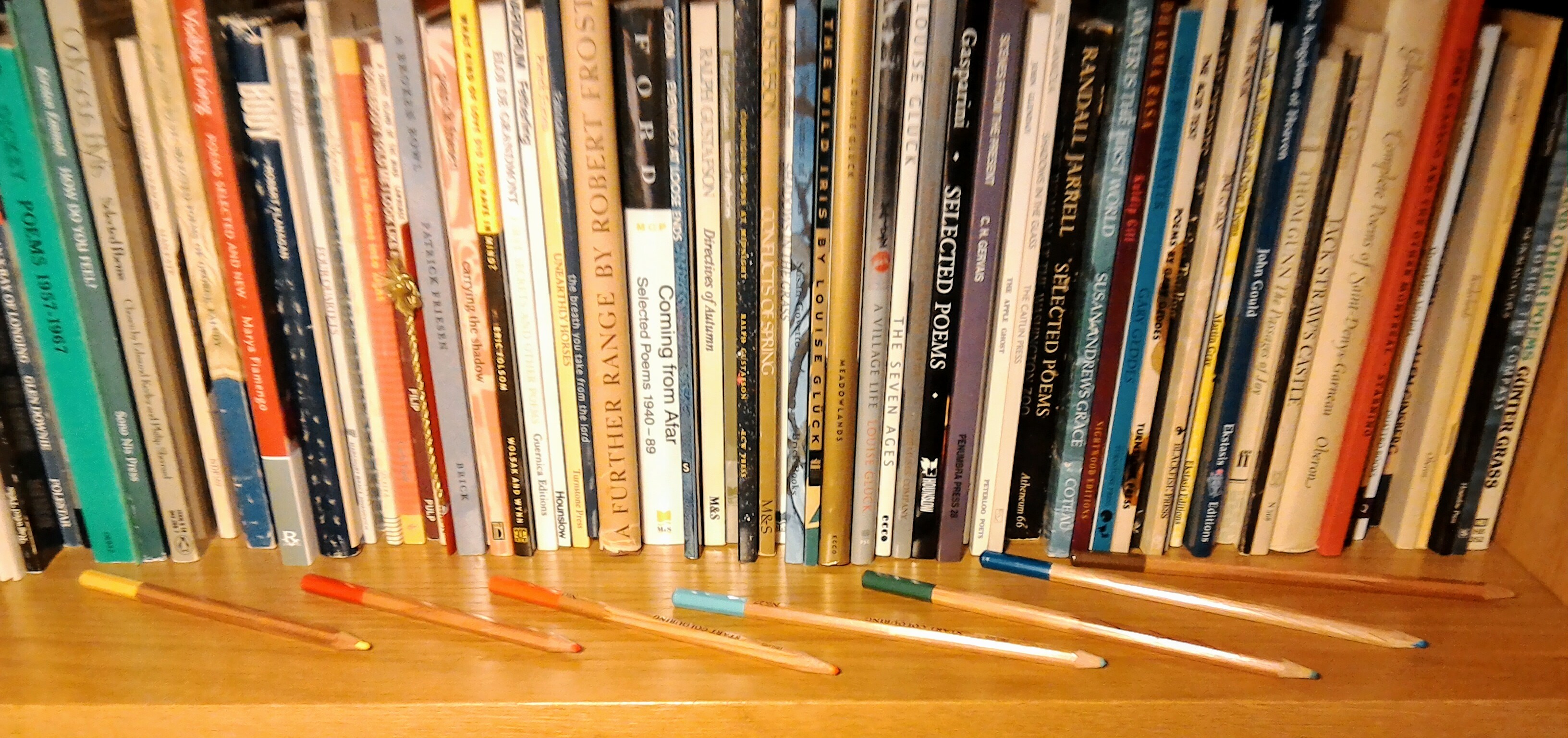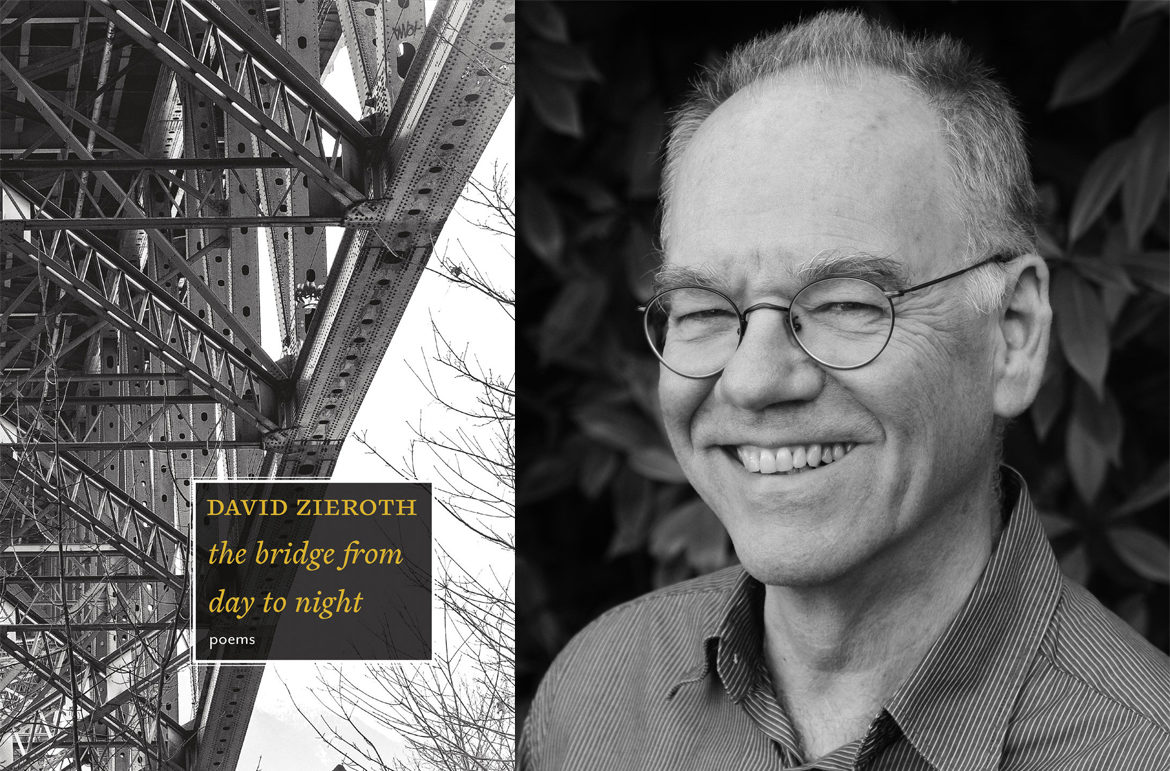Poetic Licence is a special Read Local BC column for National Poetry Month. Each column features one poet and a snapshot into their bookish world. David Zieroth is a Governor General’s Award-winning poet and his new collection is the bridge from day to night (Harbour Publishing).
How do you write your first draft of a poem?
A poem will start with an image or a thought, or someone will say something that catches my imagination. People in their daily talk are constantly providing me with more titles than actual poems I can manage to write. So poems start for me in the ear, and then I move to my tablet where the words start taking shape.
I also write by hand and on my computer, but lately, it’s been the tablet that I pick up first. I am still surprised by this development because generally I am slow to grow in technology. But in order to stay abreast of my family I needed to learn to talk to them via their devices, and so I became less of a Luddite by necessity.
How much do you edit/rewrite a poem, and how do you decide when it’s done (or good enough)?
Every poem has its own shaping, it seems. Sometimes the poem goes through several revisions, sometimes more, sometimes less. The usual process takes place over a handful of days because what seems brilliant on Monday can look a little flabby on Tuesday and downright foreign on Wednesday. I also have three or four trusted readers who frequently look at the poem and almost always find something that needs a little more tender loving care. I am hugely grateful for these indispensable ears and eyes. Often they hear and see what I have not because I have been so enamoured of the poem’s arrival that I am unable to see beyond the mystery and muscle and miracle of the thing to discern its actual bits and pieces.
What do you eat/drink while writing and why?
Eating and drinking while writing? I don’t connect the two processes. Although perhaps classic late style will allow me to expound on the special techniques of chocolate enjambment or Sangiovese aperçus…
Who would you say are the greatest influences on your work?
A difficult question and the answer often changes. Of course, there are beloved poets whose influence I am told is evident in my poems (Al Purdy, William Stafford), but I am seldom aware of such presences myself because I am just writing, and what comes, comes.
The other influence on my work is the more vibrant and constant one, or so it seems to me: my friends and my family have been vital shapers in my life and, as such, they have shaped my writing a great deal, and I am grateful for such goodness.
As a reader of poetry, what attracts you to a poem, or resonates with you?
Another difficult question. Because what I want or need when I read a poem changes depending on how I am that day. Some mornings all I want is intelligent thought, irrefutable insight into the challenges of being here in human form. By the afternoon I might be willing to handle more heightened language, more delight in wordplay, more jazz, less melody. And by the time I am ready for dreams, I could be looking for shorter versions of anything. But whatever time of day, I look for readability and transport both. I want to hear what the poet knows, and I want clarity in his or her knowing.
Where do you like to read?
My bed is one of my favourite places to read, and at any time of day, but especially at night when there is really no energy left to check off the never-ending list. I can willingly give myself over to the guilt-free pleasures of words and their ways of soothing, stimulating, surprising, announcing, assuring, calling me to be awake and sometimes even wild.
Who is a poet you think everyone should read?
This “who” changes as I change—how can it not? But at the moment the poet I’d exhort others to read is Russell Thornton. A neighbour and friend, yes, and a poet whose work has a rendering of mysteries I rarely see at work in his contemporaries. His poems often seem the result of furious focusing and serious solitude despite his quite busy life with family and work.
Show us your #Shelfie!

David Zieroth has published many books of poetry including The Fly in Autumn (2009), which won the Governor General’s Literary Award for Poetry, How I Joined Humanity at Last (1998), which won the Dorothy Livesay Poetry Prize, and most recently, Albrecht Dürer and me (2014). He taught at Douglas College in New Westminster, BC, before retiring and founding The Alfred Gustav Press. Born in Neepawa, MB, he lives in North Vancouver, BC. His latest collection is the bridge from day to night (Harbour Publishing).
Check out more 2018 National Poetry Month features here.

